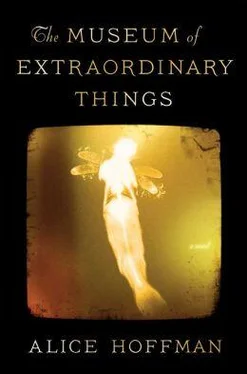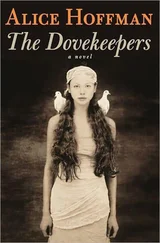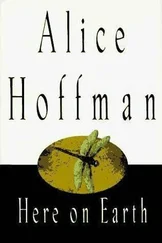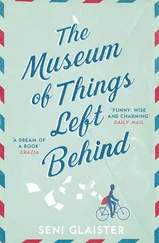I will not write down all the Professor did to me, but suffice it to say he controlled me for a time, and I seemed unable to fight him. But then there came a day when I could. Perhaps I had been practicing to do exactly that for my entire life. In our time it was not difficult to make a woman feel she was not worth much, to convince her to be quiet and not cause a ruckus and insist she keep her thoughts to herself. But my father made one mistake when he raised me. In the past I thought his error was that he allowed me to be a swimmer, and that my abilities in the water gave me the resolve to defy him. But I was wrong in my estimation of how I managed to break away from him. The mistake he made was you. He should have kept us apart. He should have dismissed you before I could walk or speak or think. Every day that we spent together was a day I treasure. You taught me who I was.
I lived among miracles, but the greatest miracle of all was that you stayed for me. I would have drowned without you to watch over me. I think you knew that. I now understand there are a thousand ways to drown, and a thousand ways to rescue someone. I never properly thanked you for saving my life.
From reading the Professor’s notes, I know you arrived to ask for work the day after he found me in the yard. Whether that was pure luck or a well-drawn plan no longer matters. Whether you were the one who placed me on the porch steps when you were unable to care for me, or whether it was a woman I will never meet in this lifetime, matters even less. I remember how you stood outside the back door when my father made you leave. The light was fading, and I was soon enough locked away, but for one vivid instant I saw you and you saw me in return. I will always think of you as you were that day, for it is an image no other can replace. I believe we saw the edges of one another’s souls.
In the charred remains of the museum I found a burned letter you asked Mr. Morris to write to me, because you hadn’t been taught how to write out your thoughts. You had intended to present the letter to me someday, but that day didn’t come before our world ended. I hadn’t the ability to write either, although I have learned, and my handwriting is surprisingly fluid. Clearly a reader can become a writer, and for as long as I can remember I could read as well as anyone. If my father gave me anything, he gave me that. There were only a few words left in the remains of the letter, but I think I made out the word daughter. Whether or not I did, I see that word in blue ink. I hear it said by you.
In my memories I have set my life in Brooklyn between pieces of glass, separate from my current existence, and this has enabled me to move forward. The past cannot tie me in knots, nor can it reach for me and cause me to drown. And yet what is stored in glass belongs to me still. Each piece is a part of me: the hummingbirds, the locked doors, Mr. Morris in the yard, the pear tree, the woman covered by bees, and you. Especially you.
We have made our home in a small village. People here know our names and our business, as we know theirs. There is a market and a dairy, and we have a large garden in which we grow beans and squash. I have two sheep, Matilda and Mary, funny creatures who follow me as I do my chores.
I spin in the evenings, and I often dye the yarn with madder root, the very herb you used to heal me when I was in need of help. All of the yarn I sell is red and I do quite well. I have even garnered a small amount of fame. People say my yarn is the color of roses. As it turned out, I have a talent for knitting. My hands, hidden for so long, are more agile than most. I have never worn gloves again. Even in the depths of winter I prefer to have my hands free. The sweaters and scarves I stitch are sold in Manhattan, at shops on Fifth Avenue. I wait for my husband on the days he brings my work into the city, the knit work wrapped in brown paper and string. I stand at the crossroads of our village where there is an elm growing that is said to be one of the oldest trees in New York. The Lenape people met here as dusk bloomed, so they might climb as far as they could into the sky and in doing so be closer to the Milky Way, the path to heaven and to those they had loved and lost. Some evenings there are dozens of starlings perched on the branches of the elm tree. When I see them, I think of our liveryman, who had more troubles with the law, but has now gone off to fight in the war overseas and is said to be a hero. I think that people can surprise you in so many ways, both with cruelty and with kindness.
I stand at the crossroads until the dark sifts down between the leaves. My husband often brings back the most unusual items from the city. A present from the milliner’s shop on Twenty-third Street, where you bought your green felt hat. A book of his photographs, published in a beautiful edition. A wedding gift to us from his father, a fragile, old quilt that carries the scent of grass. Once, most surprisingly of all, he arrived from the city with two black dogs, haughty-looking beasts with matching haircuts that now love to roll in mud and run through the meadows with Mitts.
Every time I meet my husband beneath that tree, I insist we walk home slowly. It’s my way of making each day last a little longer.
It was an ordinary life I wished for, and that is what I have. Each time I swim in the river I am driven forward when I imagine my front door, the windows facing east and north, the dogs on the porch, my husband at his work, recording the beauty of the trees in the woods so that no one will forget them. I still have the portrait he made of you in our garden. It is the only thing I saved from that time.
I pray that one day we meet again so that I can properly thank you, for no one could have asked for a kinder, more devoted friend. I hope you know I was always loyal to you. I am loyal to you still. I do not know, and I may never know, if you are my mother, but, as I could wish for no better woman to have brought me into the world, I will consider you to be so. You are the one who taught me that love was never what we expected it to be and that it was all we needed. For that, and for a thousand other things, I send my gratitude.
There are some years when everything seems to change all at once. 1911 is such a year. I have tried to do justice to this time and to New York City. Although I grew up on Long Island, I spent a great deal of my childhood in Brooklyn and in Chelsea and have lived in Chelsea on and off for most of my adult life. I have lived elsewhere, but at all times I have seen New York for what it is, a wonder of the world.
This book is dedicated to my grandfathers, Michael Hoffman and Chaim Klurfeld. One began his working life in a pie factory at the age of twelve, then became one of the first electricians to light up Brooklyn, before going on to help bring modern Chelsea to life during and after the Depression. The other was a union man, a member of the ILGWU and the Workmen’s Circle who was dedicated to the rights of working men and women. His writings, some of which were published in the newspaper the Forward , focused on the labor movement and on his childhood in Poland. Much like my character Eddie, my grandfather’s political conversion began in a single afternoon when he heard the factory owner’s children playing—in his case, swimming in a lake on a hot summer day beside the factory where he worked twelve-hour days at the age of eight.
I have tried to present the two fires that frame this book—the Triangle Shirtwaist Factory Fire and the Dreamland Fire—as best I could within a historical context while using imaginary lives and fates. Characters who are based on real people, including Monk Eastman, the gangster, and Abraham Hochman, the Jewish mystic, are real enough, and therefore their characters mirror the facts as closely as possible, but they, too, have been viewed through the glass of my imaginings.
Читать дальше












